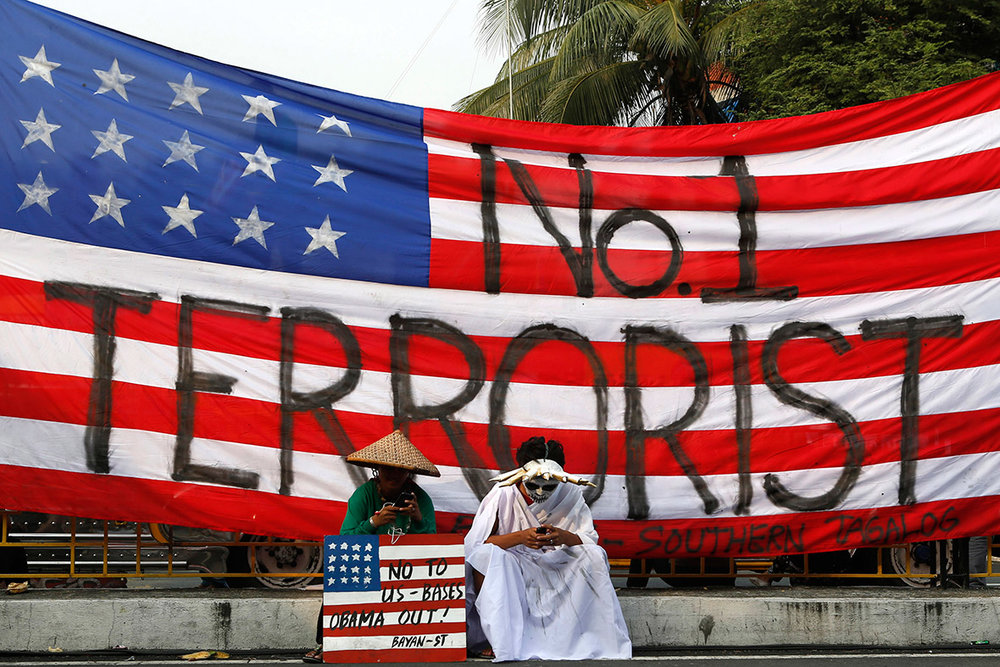Iran’s key role in fight against America’s economic terrorism

TEHRAN - The America’s economic terrorism against the Islamic Republic of Iran has assumed alarming proportions lately. But Iran stands unfazed. On August 20, 2018, Iran’s central bank-affiliated website took off U.S. dollar as a standard of measuring the average rate of Iran’s most tradable currencies. In February, Iran had switched from US dollar to Euro as the official reporting currency of the nation.
Recently President Hassan Rouhani announced a ‘secondary currency market’ and other comprehensive measures to tackle the devaluation of Rial. According to experts, Trump's hostile stance towards Iran is a major contributing factor for the devaluation of Rial, but President Rouhani’s recently announced policies are going to effectively counter this economic warfare.
The monopoly of US dollar in global trade has been effectively exploited by Washington to unleash its terror on sovereign states and to feed its unlimited deficits as beautifully explained by F. William Engdahl in his book ‘A Century of War: Anglo-American Oil Politics.’
It is easy to picture that Iran is not alone in this battle against American economic terrorism but it is on the forefront. China’s objective is also to push the global economy away from the slavery of petrodollar into the levers of real influence. This century has witnessed a ten-fold growth in Chinese economy thus claiming the status of world’s second-largest economy but Beijing is highly annoyed by dollar’s hegemony in the global financial system.
So China has now agreed on bilateral trade agreements with other victims of American economic terrorism like Pakistan, Turkey, Russia, and Iran. The People’s Bank of China and European Central Bank have agreed on a currency swap to facilitate bilateral trade between EU and China, thereby dumping about 500 million Euros worth of U.S. dollars to add Yuan in their reserves. China has also developed a Yuan-based oil future contract bypassing the U.S. Dollar dominated Brent and West Texas Intermediate benchmark.
Recently German foreign minister Heiko Maas proposed an alternative to the Society for Worldwide Interbank Financial Telecommunication system, aka the SWIFT code, in response to the unilateral withdrawal of U.S. from Iran nuclear deal and to facilitate the operations of EU companies into Iran as some companies such as Total and Maersk have suspended their Iranian operations due to the fear of reprisal from the U.S.
EU is not only challenging the SWIFT but back in 2017 Brussels proposed European Monetary Fund (EMF) in order to provide emergency financial assistance to member countries and to initiate a radical transformation into the financial institution of EU so that they can cope with the petrodollar hegemony.
According to a Wall Street Journal analyst, Gerald F. Seib, the use of petrodollar as a political weapon may cause its demise as obvious from the developments within Iran, Russia, and China, which are constantly exploring options to develop a parallel mechanism to facilitate global trade. Turkey’s changing stance and the establishment of New Development Bank (NDB) by BRICS member countries are also nails in the coffin of U.S. dollar standard.
According to a report by Forbes, Russia is also trying to develop an alternative to the SWIFT in an attempt to break the backbone of the western financial system. So Russia in consultation with China is about to introduce BRICS SWIFT. In addition to this BRICS countries have established their own bank by the name of New Development Bank (NDB), with similar functions as that of the World Bank.
China’s front to bring down the petrodollar has started with the launch of RMB priced crude oil Benchmark backed by gold which is a direct threat to current Brent and WTI benchmarks. Russia has also introduced its own payment gateway Mir to counter the U.S. based VISA and MasterCard companies. According to Russian National System of Payment Cards (NSPK), Mir has issued more than 13.9 million cards covering 10% of Russia in 2017.
Now as we have observed, Iran and a large number of other countries are facing the same problem of petrodollar hegemony and a lot of progress has been made to eliminate it. Iran has always been known for its consistent stand against the American hegemony and imperialism. Once again the world is looking at the leadership of Iran to consider the experience from monetary history and the cutting edge development into the field of technology like blockchain and hashgraph to design a much needed transparent and just economic system for the oppressed people across the world.
Technologies like blockchain and hashgraph based money, if fully redeemable in gold, can deliver a new global paradigm of financial freedom and a complete independence from U.S. dollar-based predatory international monetary system. Blockchain and hashgraph are immune to manipulation and Gold is indestructible and resistant to inflation as obvious from the monetary history of last 5000 years. Additionally, blockchain based crypto currencies constitute the most efficient medium of exchange and gold is an unmatched commodity as for as the store of value is concerned and thus a combination of these two entities is a way forward for attaining the financial freedom.
Additionally BRICS, Iran, and other countries can develop a common financial institution that will look after the business transactions within these countries and with the rest of the world. A common crypto-currency redeemable in gold and a transparent financial institution can prevent concentration of power in a single entity so that the petrodollar like catastrophe can be avoided in the future.
Writer is a student and independent researcher based in Indian controlled Kashmir.
Leave a Comment